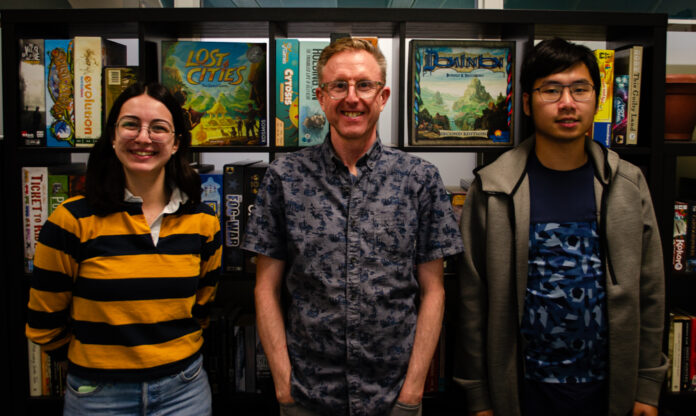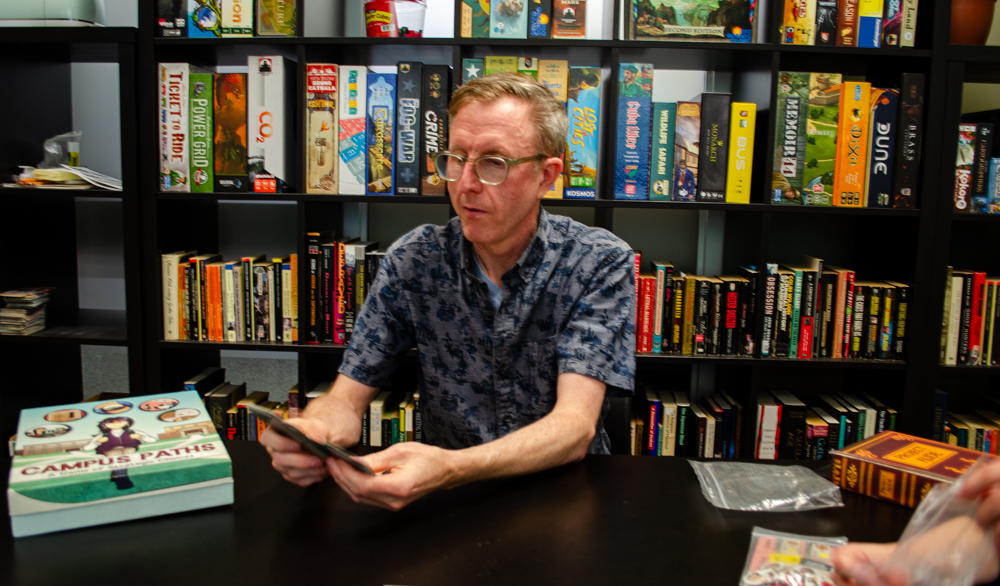

Have you ever thought of your life at university as a board game? Constantly finding new strategies to improve your life statistics with the ultimate goal of graduating.
With Campus Paths, a board game created by University of New Brunswick research group Resolve, this idea is brought to life.
Campus Paths is a modern board game focused on the university experience. Players take on academic and social challenges in order to improve their grades, mental well-being and also make money to pay tuition, all while trying to beat fellow competitors.
“I would love to see [people] sit down and play with their friends and have that be a way to bring people together as a social event, or to meet new people and things like that,” said Resolve team member Katie Roger. “That is what I’m really really excited for.”
Roger is a third-year honours student in English and comparative cultural studies at UNB. She is also a new addition to the Resolve research group, which officially launched in 2021 by UNB professor Scott Preston. The group consists of 4-6 students working together with Preston to create informative board games.
For Roger, her favourite part of the board game design process has been the playtesting. Playtesting the games to make tweaks and adjustments is a large part of the Resolve students’ jobs.
“We get to playtest our game, so we’ll spend an hour of our workday playing a board game. It’s great,” she said.
Similarly, fellow Resolve member Thomas Tam is fond of designing the actual game mechanics.
“It’s a fun process to have an idea and just throw it out, and put it in the game and see how it works out,” said Tam.
As a long-time board game fan, Tam credits games like Ticket To Ride and Pandemic as some of his favourites. For him, the adrenaline of playing a board game is the best part.
While he said some modern board games are more high-stakes, Campus Paths gives a more relaxed gameplay experience.
The board game, created in partnership with the UNB Career Centre, aims to inform students about the ins and outs of university life in a more entertaining way than just watching a PowerPoint presentation.
The group aims to sell the game to career counsellors looking for an engaging way to teach students about university, as well as students who might just want to play with their friends. Preston, Director of the Media Arts and Cultures program, is the brain behind the game.
“[I hope] that maybe playing [Campus Paths] is just a different way to make that impression on students,” said Preston. “And so they maybe take something away that they wouldn’t if they were just handed a sheet saying ‘make sure you get an internship at your university’ or something.”
Preston started creating Campus Paths during the 2020 lockdown, and eventually recruited students to work with him on the project. His passion for board games has always been present in his life, as he mentions nostalgically looking back on weekly Scrabble nights at the bar with friends in the early 2000s.
“I think I’ve rediscovered that early love for games,” said Preston. “And then once I thought about it, I realized I’ve always played games.”

Through Resolve, which uses the tagline “games for change”, Preston aims to use his love for games to produce works that are not only entertaining, but also educational.
“With this game, you’ll fall behind if you don’t strategize, so that’s the thing,” he said. “We wanted to try to transfer that idea to students.”
Although Campus Paths is still just a prototype, Preston and his students are hoping to release the game for sale after Christmas this year. The main goal is to “get it into the hands of people that can use it.” In the meantime, Resolve will continue to work on games for change.
“That is so exciting to think about the ways that we, just as a small research group, can improve people’s lives on campus and in the community,” said Roger. “That’s really our focus moving into the future: what can we do to better the place around us through games?”
